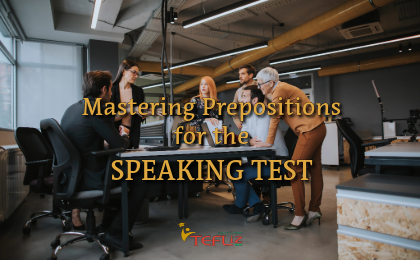Prepositions for IELTS & TOEFL Speaking Test
Navigating the intricate world of prepositions can be daunting for many IELTS and TOEFL students. These tiny words – ‘in’, ‘on’, ‘at’, and many others – play a crucial role in English, especially in the Speaking section of the IELTS and TOEFL exam. The correct use of prepositions not only enhances the clarity of your communication but also reflects your proficiency in English. This blog post aims to guide you through the effective use of prepositions, helping you to boost your IELTS speaking score.
Understanding Prepositions for IELTS and TOEFL Speaking
Prepositions are words that link nouns, pronouns, or phrases to other words within a sentence. They express relationships between elements in a sentence, such as time, direction, place, manner, or cause and effect. Examples include words like ‘at’, ‘in’, ‘on’,
Common Prepositions and Their Usage
- Time (at, in, on):
- Use ‘at’ for specific times (e.g., at 5 pm, at midnight).
- Use ‘in’ for months, years, centuries, and long periods (e.g., in April, in 2022, in the Ice Age).
- Use ‘on’ for days and dates (e.g., on Monday, on July 4th).
- Place (at, in, on):
- Use ‘at’ for specific points (e.g., at the corner, at the bus stop).
- Use ‘in’ for enclosed spaces (e.g., in the room, in the garden).
- Use ‘on’ for surfaces (e.g., on the table, on the wall).
Prepositions in Phrasal Verbs
Prepositions are often used in phrasal verbs, which can be tricky. For instance, ‘look up to someone’ means to respect someone, and ‘look after someone’ means to take care of someone. Understanding these nuances is vital.
Practical Tips for Using Prepositions for IELTS and TOEFL Speaking
- Listen and Mimic: Pay attention to how native speakers use prepositions in different contexts. Watching English movies, listening to podcasts, or engaging in conversations can be helpful.
- Practice with Examples: Create sentences using different prepositions to understand their usage better. Regular practice can significantly improve your fluency and accuracy.
- Seek Feedback: Whenever possible, get feedback on your use of prepositions from teachers, native speakers, or language exchange partners.
Small But Mighty
Prepositions might seem small, but they are mighty in the realm of language. A good grasp of prepositions can add clarity and precision to your speech. Remember, practice and exposure are key. Embrace every opportunity to listen, speak, and write in English, paying special attention to the use of prepositions. With perseverance and the right strategies, you’ll find that mastering prepositions is not just possible but also incredibly rewarding.
For more insightful tips and strategies on acing your IELTS and TOEFL Speaking test, don’t forget to check out our other articles. Your journey to IELTS success starts here!

